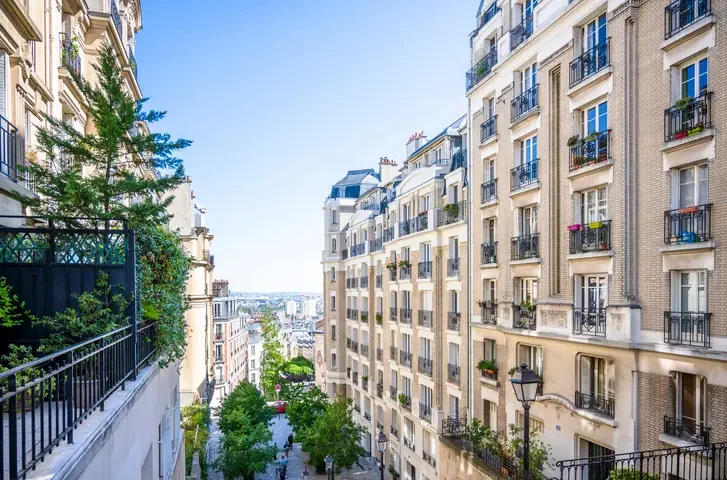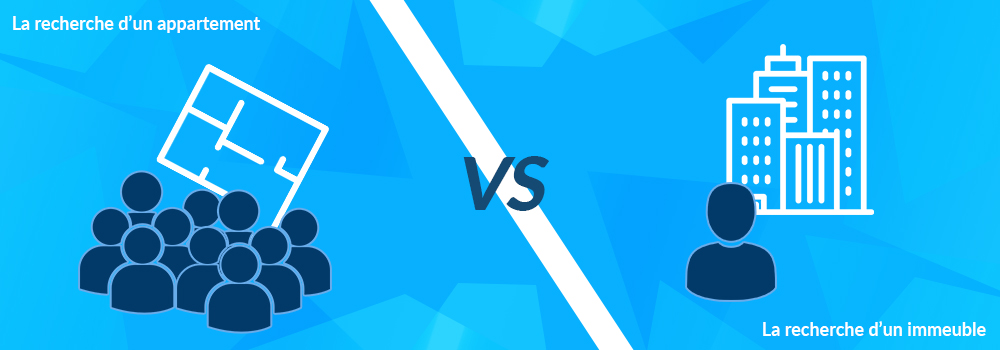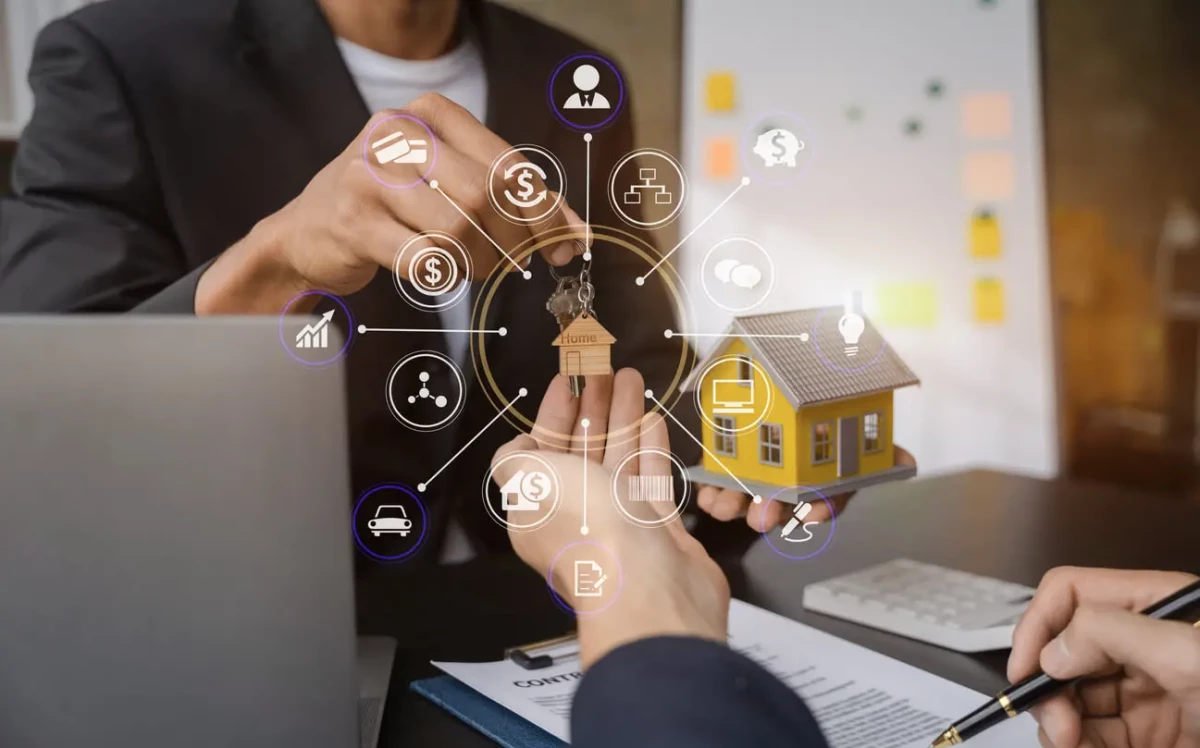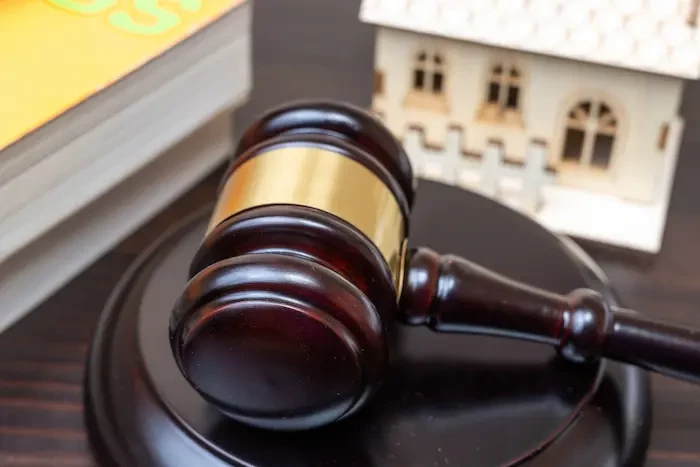Immeuble de rapport : tout savoir avant d'acheter un immeuble !

The apartment building: a real good plan? This is the question that my clients or investors often ask me at seminars. "What about you, Michael, do you invest in investment properties on a personal basis? In what cities?"
Investir dans un immeuble fait rêver beaucoup de monde. Et moi le premier. J'ai débuté en achetant un studio de 14 m2 à Paris. Depuis j'ai acheté plus d’une dizaine d'appartements à titre personnel, et plusieurs centaines pour mes clients par le biais de ma société Investissement Locatif. Mais acheter un immeuble entier m'a toujours fasciné.
D'abord parce que j'adore l'immobilier, et que chaque bâtiment a une histoire. Posséder un immeuble entier, et dédier chaque lot de cet immeuble à l'habitation dans le cadre du locatif est une expérience incroyable. Je me rappelle la sensation d'excitation lors de la visite de mon premier immeuble. Les vendeurs qui m'expliquaient que l'immeuble s'étend "de là à là". Enorme. Mon associé et moi étions comme des enfants avec un nouveau jouet.
Mais acheter des immeubles de rapport peut s'avérer très technique. Et en cas d'erreur, le risque est plus élevé que sur de l'achat de lots diffus.
Je suis Mickael Zonta, serial-investisseur et directeur de la société Investissement Locatif.
Dans cet article vous découvrirez des conseils pour acheter un immeuble de rapport ou une maison de rapport. Ces conseils sont issus de mon expérience d'investisseur, et de mon activité de conseil en investissement immobilier. Je dirige une équipe de 200 personnes et nous avons réaliser plus de 2000 projets d'investissement.
Report building definition
The investment property or rental property is a rental product. It is an entire building, an entire building dedicated to generating rental income. The word "report" means that the owner of the building is waiting for (and gets) a rental report.
Il s’agit d’un immeuble divisé en plusieurs lots, qui sont loués par un ou plusieurs propriétaires à des locataires. Il est généralement détenu par un seul propriétaire-bailleur, ce qui présente l’avantage d’éviter le statut de copropriété (donc les frais de syndic).
The definition of investment property is quite simple, and I often explain to my clients that they will have two main advantages: first, they will have a larger amount of money invested in a single operation. This is the equivalent of a bulk purchase.
Second, the rental yield of investment properties is higher, and owning freehold property will also save trustee fees.
What I found out about the apartment buildings...
Si vous avez lu ma biographie et mon parcours d’investisseur immobilier, vous savez que j’ai débuté à Paris intra-muros.
Mon premier projet a été réalisé dans le 19ème arrondissement, puis j’ai successivement investi dans le nord et l’est de Paris. A cette époque, je ne jurais que par Paris intra-muros.
Pourquoi ? Parce que la forte demande de la ville permet d’assurer une excellente liquidité en cas de revente, et un taux de vacance locative très bas (voire inexistant). La taxe foncière est également très basse, et Paris ne dispose pas de réserve de foncier.
Le fait que d’une part aucun terrain constructible ne soit disponible, et que d’autre part la ville soit un centre économique et international m’a conforté dans ce choix et j’ai investi personnellement sur plus d’une dizaine d’appartements.
Mais j’ai découvert les immeubles de rapport…
Avec l’appui de mon équipe, nous accompagnons les clients dans des projets clé en main pour des immeubles de rapport. Même logique que pour les autres opérations que nous réalisons : mon équipe déniche des immeubles à potentiel, nous restructurons et rénovons, avant de louer des biens de qualité.
Mes clients ont compris que l’intérêt est différent, et que cette stratégie d’investissement – investir dans un immeuble de rapport - est complémentaire aux investissements parisiens. Moins de liquidité en cas de revente, un taux de vacance locative supérieur, une taxe foncière nettement plus élevée. Et pourtant, de vrais atouts qui m’ont poussé à personnellement me tourner vers ce type de produits.
Investing in a building: the 3 advantages that make the difference
Advantage n°1 : Buying in bulk allows you to negotiate the price... even in real estate.
Acheter un immeuble de rapport pour le louer présente plusieurs avantages. D’abord concernant l’acquisition : vous achetez un bâtiment entier, donc plusieurs appartements… d’un coup. Si vous avez déjà acheté quoi que ce soit en gros, vous comprenez qu’il est plus facile de négocier avec le vendeur quand vous achetez plus qu’un produit.
Ici je vous parle d’immobilier, mais c’est exactement pareil. Acheter un immeuble vous permettra donc de bénéficier d’un prix au m2 moins élevé (comparer à des biens de petites surfaces sur la même zone géographique). Attention : comme dans toute règle il existe des exceptions, et je vous en parle à la fin de l’article.
Price negotiation is also the result of buying pressure. It's simple: the higher the amount, the fewer potential buyers. Unfortunately the French with few means are more numerous than the rich French. Buyers are therefore in a position of strength.

Advantage n°2: Investing in a building means making a larger amount of money work, therefore getting richer faster!
Je sais, vous vous dites que j’enfonce une porte ouverte. Mais cette notion de faire travailler un montant plus important est primordiale. Imaginez que vous puissiez emprunter 2M€… comme c’est le cas de certains de mes clients. Combien de temps faudrait-il pour investir cette somme et donc commencer à capitaliser, en recherchant des studios à 50.000€ ?
La réponse est évidente : il faudrait acheter 40 studios. Si vous cherchez 40 lots isolés et que vous faites 40 fois les étapes du financement, des notaires… cela vous prendra beaucoup de temps.
En tant que conseiller en investissement locatif, j’ai souvent cette question : « Mickael, quel est le produit idéal pour investir ? Est-ce le parking, le studio, le T2, la colocation ou l’immeuble de rapport ? »
The answer is a normand answer: it depends on the investor and his situation.
I edited a video on investment properties and warned about buying a rental property that is very isolated or located in areas with a rapidly shrinking population. Disaster areas. Some investors who appreciate and invest in these areas have reacted virulently.
Attention : je n’ai jamais dit qu’investir dans un immeuble en pleine campagne, à 90.000€ pour 400M2 est nécessairement une mauvaise affaire. Mais il faut redoubler de méfiance et avoir une excellente connaissance du marché.
Personnellement j’essaie de privilégier des immeubles en région parisienne (parce que je maitrise la zone), et parce que les tickets d’investissement sont relativement élevés. Si je sors de Paris et que je me tourne vers ce type de produit, c’est pour faire travailler des sommes investis plus importantes : à partir de 600K€ sur les zones dans lesquelles j’investis.
For smaller amounts I would tend to turn to condominium properties. Why would I do that? Because for the same rent, you won't have to pay for the whole facade, the roof or a high property tax.
Avantage n°3 : Le rendement locatif des immeubles de rapport
Les investisseurs apprécient les immeubles ou maison de rapport parce qu’ils délivrent des rendements locatifs plus élevés. Logique, vous avez acheté moins cher, parce qu’en gros (avantage n°1) mais vous louez les appartements un par un… donc au prix de marché. Cela permet de booster la rentabilité d’un immeuble de rapport.
Vous êtes propriétaire de tout le bâtiment, donc en pleine propriété, à l’opposé de la copropriété. Cela vous permet d’éviter les frais de syndic, donc de booster encore le rendement net de l’opération. En plus de l’avantage financier, j’apprécie également d’être chez moi dans mes immeubles, donc de pouvoir décider seul des travaux et de l’entretien. C’est plus simple et un vrai gain de temps.
Bien sûr, comme dans tout investissement locatif, il est généralement plus intéressant de rechercher une affaire dans les annonces de vente d’immeuble à rénover. Mais je traite les avantages de la rénovation (plus-value, valorisation, avantage fiscal) dans d’autres articles, que je vous invite à découvrir sur mon site.
Where to buy an investment property, and for how much?
Il n’y a pas de bonne réponse. Je rencontre régulièrement des investisseurs qui possèdent des immeubles aux 4 coins de la France. Comme pour l’achat de lot au sein de copropriété, l’achat d’un immeuble de rapport diffère sur l’aspect financier selon le lieu d’investissement. Certaines régions sont plus rentables que d’autres, et je vous conseille surtout de savoir ce que vous cherchez.
Faites le point sur vos vrais objectifs d’investisseurs. Voici 3 questions dont les réponses vous guideront pour choisir le lieu d’investissement pour votre prochain immeuble :
1 - Quel budget je souhaite investir ?
2 - What risk am I willing to take? (This answer will guide the return)
3 – Une fois les 2 premières définies, intéressez-vous plus précisément au marché : combien d’offres similaires sont disponibles dans la zone ? Quelle est l’évolution démographique ? La zone dispose-t-elle d’entreprises solides ? D’une quelconque attractivité ?
Investir dans un immeuble isolé, d’une valeur de 50.000€ et avec un rendement de 15% n’est pas forcément une mauvaise option. Cela dépend de vos objectifs. Mais il faut le faire en pleine conscience et que ce soit un choix éclairé. Est-ce que le fait de disposer de 15% de rendement au lieu peut être de 12% dans une zone plus dynamique change votre projet ?
Est-ce que le fait que le bien soit très peu liquide donc que la revente puisse prendre des mois voire des années est un problème pour vous ? Est-ce qu’il y a de la vacance locative… ? Posez-vous simplement les bonnes questions en amont pour ne pas vous retrouver dans des situations compliquées.
Personnellement, j’accompagne les investisseurs sur des projets d’immeubles de rapport en région parisienne entre 600K€ et 2M€ avec des rendements entre 8% et 10% (clé en main en incluant mes honoraires et une rénovation complète) et dans des zones attractives.
Acheter un immeuble de rapport à Lille, ou un immeuble de rapport en Île de France semble par exemple des options intéressantes. Car elles combinent rendement locatif élevé et attractivité du marché. Je peux également citer Bordeaux, Paris, Lyon qui restent des villes très attractive, à condition d’avoir les moyens de ses ambitions.
L'impact des fluctuations économiques sur l'immobilier locatif : Quelles stratégies adopter ?
L'économie bouge, et l'immobilier locatif aussi. Surtout pour les immeubles de rapport. On dit que l'immobilier est sûr, mais ce n'est pas si simple. Face à une crise, un immeuble de rapport peut bien tenir. Ou au contraire, devenir plus fragile. Ici, on voit comment ces changements affectent les immeubles de rapport. On vous dit comment adapter votre stratégie d'investissement. Réussissez même quand c'est difficile.
La résilience des immeubles de rapport en période de crise
L'immobilier locatif, surtout les immeubles de rapport, est assez solide. Même quand l'économie va mal. Pourquoi ?
-
Demande locative stable : Les gens ont toujours besoin d'un logement. En crise, la demande de logements abordables peut même monter. Surtout là où acheter est trop cher. Les immeubles de rapport offrent plusieurs logements. Ils répondent à ce besoin.
-
Diversification des revenus : Un immeuble de rapport a plusieurs lots. Si un locataire part, vos revenus ne s'effondrent pas. Le risque est partagé. L'immeuble est moins sensible aux crises.
-
Valeur refuge en temps de crise : L'immobilier est un bien concret. Les actions, elles, peuvent chuter vite. L'immobilier garde une valeur stable sur le long terme. En crise, beaucoup d'investisseurs achètent de l'immobilier. Ils veulent protéger leur argent. Cela fait monter la demande pour ce type de bien.
Mais l'emplacement reste clé. Dans certaines zones, la demande locative peut baisser. Surtout si les emplois disparaissent. L'immobilier de luxe peut aussi être moins demandé. Moins de monde peut payer des loyers élevés.
Les risques d’un investissement immobilier en période de crise
Certains moments économiques rendent l'investissement immobilier plus risqué :
-
Risque de vacance locative élevée : En crise, des locataires ne peuvent plus payer ou partent. Le logement reste vide plus longtemps. Si votre immeuble de rapport est dans une zone touchée, vos revenus baissent.
-
Augmentation de la pression fiscale et des charges : Quand l'économie ralentit, les gouvernements peuvent augmenter les impôts. Les taxes foncières peuvent monter. Les charges d'entretien aussi. Les règles de gestion locative peuvent se durcir. Les immeubles de rapport, surtout en ville en difficulté, peuvent voir leur rentabilité baisser.
-
Difficultés d’accès au financement : En crise, les banques prêtent moins facilement. Obtenir un crédit devient plus dur. Cela limite votre capacité à acheter ou bien financer un immeuble de rapport. Des taux d'intérêt plus hauts rendent les prêts plus chers. La rentabilité de votre investissement en pâtit.
Stratégies à adopter en fonction de l’environnement économique
Investir en immeuble de rapport demande de s'adapter. Voici des stratégies pour maximiser vos gains et réduire les risques en toutes circonstances.
Privilégier des secteurs géographiques résilients
L'emplacement est déterminant. Choisissez des zones géographiques solides face aux crises. Des villes avec une forte demande locative. Elles doivent avoir une économie locale forte. Une croissance de population et un tissu économique variés sont des atouts.
Les grandes villes ou leurs périphéries près des centres économiques gardent leur attrait. Pensez aux zones d'emploi ou aux universités. Les villes moyennes ou la campagne peuvent plus souffrir. Surtout si leur économie dépend d'un seul secteur.
Diversifier les types de biens au sein de l'immeuble
Un immeuble de rapport a plusieurs logements. Diversifiez-les. Ayez des studios, des appartements familiaux, des bureaux, des commerces. Par exemple, des appartements de tailles différentes attirent des locataires variés. Cela réduit les risques de loyers impayés ou de logements vides.
Mélanger les usages est aussi une bonne idée. Avoir des logements et des commerces équilibre les risques. Surtout en ville, où les petits commerces restent recherchés, même en période difficile.
Optimiser la gestion locative et anticiper la vacance locative
Une bonne gestion locative est essentielle. Elle réduit le temps où les logements sont vides. En crise, vérifier la solvabilité des locataires est plus important. Répondez vite à leurs demandes. Maintenez bien les lieux.
Prévoyez des fonds pour les périodes sans locataire. Ayez assez de trésorerie. Les baux longs (pour commerce ou habitation) peuvent aussi sécuriser vos revenus. Surtout quand l'avenir est incertain.
Profiter des opportunités d’achat pendant les crises
Les crises peuvent offrir des chances. Achetez des immeubles de rapport moins cher. C'est possible si les prix de l'immobilier baissent temporairement. Si vous avez une vision long terme et les fonds, c'est une occasion. Vous achetez des biens sous-évalués. Vous faites de bons profits quand le marché remonte.
Pendant les crises, certains investisseurs peuvent obtenir de meilleurs financements. Ceux avec un bon dossier ou un gros apport personnel. Ils peuvent négocier des conditions de prêt plus avantageuses.
Anomalies in the property market
En accompagnant des centaines d'investisseurs, j'ai identifié des distorsions surprenantes sur le marché des immeubles de rapport. Voici comment elles se manifestent concrètement et pourquoi elles bouleversent les stratégies d'achat.
L'effet "prix premium" des immeubles
Dans certaines zones, les immeubles de rapport sont plus chers au m² que les biens isolés. À Paris 19ème, un immeuble vide de 700m² à rénover était proposé à 8 500€/m², alors que les appartements individuels se négocient autour de 6 500€/m² maximum.
Pourquoi les professionnels surpayent
Le commerce immobilier répond à l'offre et à la demande. Avec des tickets d'investissement dépassant le million d'euros, les acheteurs changent : fonds d'investissement et fortunes privées privilégient des rendements plus faibles sur des montants plus élevés, plutôt que de maximiser le rendement brut.
L'impact des marchands de biens
À Lyon, la concentration exceptionnelle de foncières et marchands professionnels fait grimper les prix des immeubles. Cette dynamique locale crée une surchauffe spécifique, indépendante des tendances générales du marché.
Évolution de votre stratégie
Si vous visez aujourd'hui des immeubles à 80 000€ ou 1 000 000€, une fortune immobilière future vous orientera naturellement vers des rendements moindres mais des volumes plus importants. C'est l'anomalie : la taille change les règles du jeu.
Perhaps you too will be interested in a lower return, but with a larger amount invested.
What you need to remember
Pour résumer, investir dans un immeuble peut s’avérer très intéressant si vous souhaitez faire travailler un montant supérieur. Si vous vous tourner vers les immeubles pour le rendement locatif qu’ils offrent, attention à diversifier votre patrimoine, avec par exemple des projets très liquides (faciles à revendre) en centre-ville.
Cela peut être nécessaire si vous avez besoin de liquidité pour aider un membre de votre famille, pour réaliser un projet personnel ou en cas d’accident de la vie.
Keep in mind that buildings require a great deal of technical expertise. The cost of the work is proportional to the surface area of the property, not the purchase price. Whether your 300m2 building is worth 80,000€ in the countryside, or 800,000€ in the Paris region, a roof is a roof. The work can be expensive and you must anticipate and be very careful when buying. I advise you to seek the advice of a professional such as an architect.
The benefits are real if the operation is under control: high return, full ownership and a high investment envelope. I recommend this type of investment product if you want to accelerate the development of your assets and build a real estate empire.
Personnellement au-delà des critères financiers, je trouve que l’investissement dans des immeubles est magique. Vous allez loger plusieurs personnes ou famille. En plus d’être un produit d’investissement, je ressens un sentiment de fierté, et d’admiration lorsque je visite mes immeubles. Ces bâtiments sont chargés d’histoire, et ils sont des lieux de vie et c’est fabuleux.
Vous souhaitez acheter un immeuble rentable ? Bénéficiez de l'expertise de mon équipe et déléguez la totalité du projet. Contactez-moi.
These articles may also be of interest to you
-

La garantie de revente protège votre investissement si un événement prévu au contrat vous oblige à revendre à perte, avec une couverture annoncée jusqu’à 10 ans (sans franchise) et un plafond pouvant aller jusqu’à 60 000 € selon conditions. L’indemnisation se calcule à partir de la différence entre le prix de vente net (prix de vente – frais d’agence) et le prix d’achat total (prix d’achat + frais de notaire + frais d’hypothèque + travaux prévus dans l’acte de prêt), dans la limite indiquée (jusqu’à 20% du prix d’achat total).
-

Pour investir dans l’immobilier au Maroc, commencez par fixer un objectif (location longue durée, courte durée, revente), puis choisissez une ville et un micro-quartier où la demande locative est réelle. Ensuite, posez vos chiffres avant d’acheter (budget total, loyer basé sur des comparables, rendement brut puis net) pour éviter les calculs trop optimistes.
-

La loi anti-squat de 2026 simplifie la procédure d’expulsion, accélère les délais et protège tous les types de biens. Elle renforce les droits des propriétaires, facilite l’intervention de l’État et cible les squatteurs avec des sanctions dissuasives.



